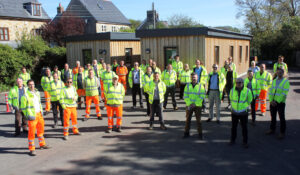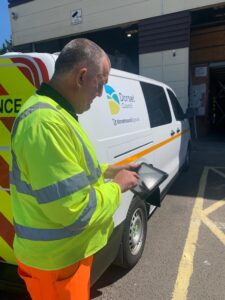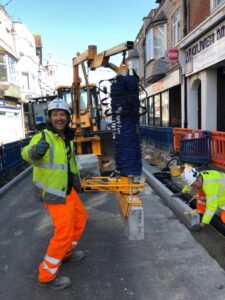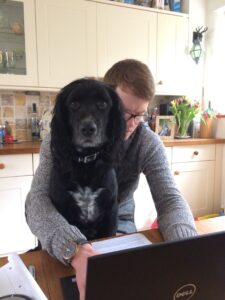After more than a year where most people have worked from home it looks like the working landscape has changed for good.
While some people begin the return to the office others are deciding that working from home is here to stay.
There will also be many people hoping to combine both.
And, of course, our wonderful front-line workers continue their valuable work on the coalface – our nurses and doctors, teachers, shop workers, social workers, engineers, plumbers and highways teams.
What all these different sets of people need more than ever to embrace a hybrid way of working is good technology and connectivity.
Dorset Council’s Melissa Craven spent time with the highways team to shine a light on hybrid working in action.

Hybrid working is a hot topic and something that teams across Dorset Council are discussing as we look at how we work in the future.
It’s where you have employees doing their jobs and working together from different spaces. Some people may be based in an office or other building, at home, on a site or in the local community.
For us at Dorset Council, teams working from multiple locations at any one time will be new for some, but not for others.
Take Highways, for example. As a service they have 285 employees working from multiple locations – some from a construction site, a vehicle, an office, depot and home. Their work covers essential maintenance, urgent repairs and construction projects on the 2,400 miles of road across Dorset.
I spoke to Service Manager for Network Operations, David Clegg, and Senior Site Agents, Paul Hughes and Ross Sturmey, to find out how they work effectively together when colleagues are mostly working from different places and at different times.
Using tech to work and connect – ‘just as important as the hard hats’
Most of the highway operatives have access to a personal tablet. This not only helps them work efficiently and with less paper but also allows teams to keep in touch and share important information, with video calls taking place on site as the norm.

The tablets are used for work allocation and schedules, audits, risk assessments and more. If there’s been an accident or part of the network has been damaged, employees can take pics on site – capturing evidence and allowing the council to claim money back if needed.
And Site Agents (who are responsible for the day-to-day site management) all have a bag with a laptop, smart phone, paperwork, some coffee and anything else they need – as they often use a van as their office.
Paul said he can easily cover 50 miles a day on the road: “Pre-pandemic I had access to a desk, but I never used it. I work 60-70 % time at home and then the rest of the time I’m mobile.”
Customer first
When we talk about hybrid working, we say that service needs come first. For Highways, the customer is always in their minds.
 David said: “We’re really customer focussed. Just being one person down on site will impact the rest of our road network and customers – so it’s important that we work well together. At all levels across the service from apprentice to a head of service, it’s about overcoming problems. How do we make this work quieter? Finish it quicker? Make it more environmentally friendly? We act as a team and know what we have to do because we consider our customer needs above our own.”
David said: “We’re really customer focussed. Just being one person down on site will impact the rest of our road network and customers – so it’s important that we work well together. At all levels across the service from apprentice to a head of service, it’s about overcoming problems. How do we make this work quieter? Finish it quicker? Make it more environmentally friendly? We act as a team and know what we have to do because we consider our customer needs above our own.”
Lines of communications

David, Paul and Ross all agree that communication across teams is key when it comes to hybrid working and they have a clear and consistent structure in place.
The head of service sends a monthly update and then David, Paul and Ross hold virtual morning meetings for 30 minutes twice a week to highlight any issues and the agenda is always structured.
David said: “Most of our communication is done via video or via email. All of our time is costed on a job – so time is money and it would be inefficient, both in terms of time and for the environment to have lots of us travelling to one place for a meeting every week.”
Ross says when he talks to his team during the week, they follow the same agenda:
“We have a 10-15 min conversation over the phone 2-3 times a week. It’s a small agenda and we stick to it – we basically discuss what we are doing this week, what’s coming up next week and what do we need to do to make that happen. It’s short, sharp and to the point.” He said.
Toolbox talks – a time to meet in person
Teams then have a monthly operational meeting (known as a toolbox talk) where everyone comes together in person – and that face-to-face contact is still important.
When they do meet in person it’s made clear that everyone should attend and the purpose of those sessions is to go over vital information relating to their work, such as health and safety rules, important council information and employee recognition.
David said: “When we do meet face to face – we are all there. We value it. It’s important to have those times when we get together to celebrate. It was really important that we that we came together recently for our first toolbox talk at our new Bridport depot. It’s a place where many will work from and it was important to recognise this and get together socially.”
Highways has found a rhythm for hybrid working that works well for their service and employees. While services need to find what works for them, it’s good to look at how others do it.
David added: “I’m not saying that what we do is better or worse than any other team (and it will be different for every service), but my advice would be don’t be afraid to talk to each other to get a different perspective. We make a point of picking the phone up to talk to other services to find out how they do things to see if we can take anything from that – and we’re happy to talk to anyone who might be interested in the way we do things too.”
Flexible working and trust
Due to the nature of their work, Highways don’t have core hours or a flexi scheme. This is because their business needs mean they sometimes have to work at specific hours, as there are restrictions on certain roads, or the business needs dictate work has to be done at a certain time.
But they do plan work in ways that also supports the needs of individuals too.
David said: “We have some people who are part of the Territorial Army (TA) and retained firefighters. As always, we must meet the business need, but we normally have a way of working round that. So the firefighter always works in the Weymouth area so he can attend callouts if need be, and the colleague who is part of the TA wouldn’t be placed on a large construction project, in case he was called for service.”
And if anyone wants to take leave or time off for something, individuals are responsible for making sure cover is sorted themselves, so the service needs are met. They trust employees to fulfil their role regardless of their hours or place of work.
Paul said: “We don’t have flexi-sheets, but we do have flexible hours. We have a culture where individuals are responsible for finding appropriate cover if they need to take time off and we trust them to do this.”
This supports employees’ needs and provides opportunities for team members to act up while someone is off and try different roles too, which is great for their development. Paul added:
“There’s a real dynamic, can do attitude. You really notice it. It’s different a perspective, but I think it’s the right way to look at it. We know that they all do more than their fair share and trust that the work will get done.”
Has your way of working changed since the pandemic? Will you be going back to how things were before, will you stay working from home or will you embrace a new, hybrid, way of working?
We’d love to hear your experiences – has Covid and technology changed the way we work for good? Comment below.

I have worked in communications for 25 years, first as a journalist and then in public and private sector public relations. From Southampton originally, I have lived in beautiful Dorset for the last two decades. My passion for Dorset has also turned into a passion for landscape photography. My other great loves are my family and Southampton Football Club.
